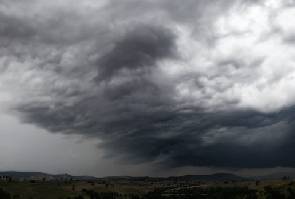We have no challenge with weather forecast, rains just erratic – Meteo Service

The Head of Forecasting at the Meteorological Service Department, Joseph Portuphy has said the department does not have any challenges in providing accurate prediction of rainfall pattern.
Speaking on Eyewitness News he said, the only challenge they might have is telling the volatile nature of the rains that the country might experience.
We don’t have any challenge with the model for the forecasting of the weather, our only challenge may come with the erratic nature of the rains. For example, the rains may start very slow and but might heat up as it continues, but we don’t have any challenge with the forecasting of the weather,” he said.
He said that within the next 24 hours, the North Eastern part of the country would experience low to moderate rain.
“Weekly forecast is being typed right now, what we are expecting is that within 24 hours, there would be partly cloudy condition over the North Eastern part of the country which might lead to low to moderate rains over the eastern part of the country,” he said.
The Meteorological Service Department has predicted thunderstorms and heavy rains as the country moves into the raining season.
Earlier the Department clarified that rainfall experienced last month in the Southern part of the country did not yet indicate the beginning of the rainy season.
But, in an interview with Citi News, Joseph Portuphy said Ghanaians should brace themselves for more rainfall in the middle belt and coastal areas.
We are now in the rainy season, so definitely we should be expecting more of this. Especially those of us in the middle part of the country- the forest zone. Every three days we should be expecting more rains. Those along the coastal areas should also expect rains every five to six days.”
Climate change impeding accurate weather forecast – Analyst
A climate change analyst had earlier said accurate prediction of weather situations in the country has become difficult due to climate change.
Dr. Emmanuel Owusu, who serves with the Environmental Protection Agency (EPA) said climate change has affected rainfall pattern in the country and is negatively affecting all aspects of national development.
Dr Emmanuel Owusu in an interview with Citi News following several hours of rain on Sunday that left at least six people dead, said data show that the volume of rain in recent times have decreased.
He noted that greenhouse gas emission and global warming are attributable to the irregular rainfall patterns and the corresponding volumes recorded.
“We have a problem so this situation we find ourselves in has serious consequence on all the sectors of national development. It is difficult to determine when the rains are coming and even in the year, which quantity is coming because the normal rain that we used to have is not what we are having. But when you put it together, in a year, the rainfall has become less than what it used to be in the 1960s. It is all due to the changes in temperatures which affects the rainfall. The atmosphere is drier now and warm,” he said.
Source: Citinewsroom.com





